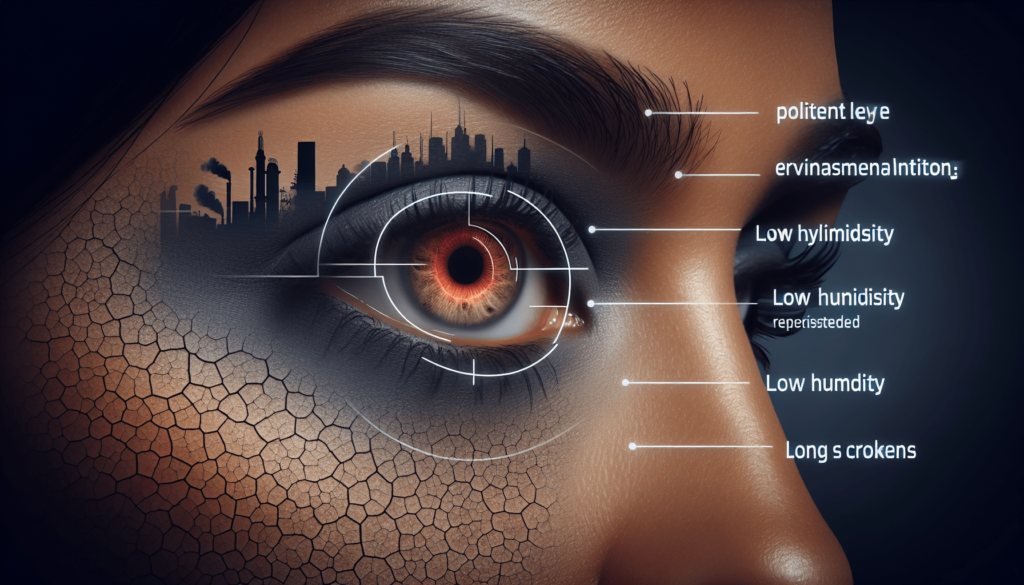Welcome to an insightful discussion on whether diabetes can play a role in the development of dry eye. As someone dealing with diabetes, you may be curious about how this condition could potentially impact your eye health. Join us as we explore the potential connections between diabetes and dry eye syndrome, and learn about the important steps you can take to protect your eyesight. Let’s dive in and discover how managing diabetes can help maintain your eye health.
Can Diabetes Be A Factor In Developing Dry Eye?
Have you been diagnosed with diabetes and noticed changes in your eye health? It’s essential to understand the potential link between diabetes and dry eye syndrome. In this article, we will explore the connection between diabetes and dry eye and provide you with valuable information to help manage your eye health.
Understanding Diabetes and Dry Eye
Diabetes is a chronic condition that affects your body’s ability to regulate blood sugar levels. When you have diabetes, your body may not produce enough insulin or use it effectively, leading to high blood sugar levels. This can have various effects on different parts of your body, including your eyes.
Dry eye syndrome, on the other hand, is a common eye condition characterized by a lack of sufficient lubrication and moisture on the surface of the eye. This can lead to discomfort, irritation, and vision problems. While there are many factors that can contribute to dry eye, diabetes is increasingly recognized as a potential risk factor.
How Diabetes Affects Eye Health
Diabetes can affect the eyes in several ways, leading to various eye conditions and complications. One of the primary ways diabetes impacts eye health is through damage to the blood vessels in the retina, a condition known as diabetic retinopathy. This can lead to vision loss and blindness if left untreated.
In addition to diabetic retinopathy, diabetes can also affect the health of the cornea, the clear outer layer of the eye. High blood sugar levels can cause changes in the structure and function of the cornea, leading to dryness and other symptoms of dry eye syndrome.
The Link Between Diabetes and Dry Eye
Research suggests that there is a significant link between diabetes and dry eye syndrome. Several studies have found that people with diabetes are more likely to experience dry eye symptoms compared to those without diabetes. The exact mechanism by which diabetes contributes to dry eye is not yet fully understood, but it is believed to be related to a combination of factors, including:
- Decreased tear production: Diabetes can affect the lacrimal glands responsible for producing tears, leading to decreased tear production and resulting in dry eye symptoms.
- Changes in tear composition: High blood sugar levels can alter the composition of tears, leading to instability in the tear film and increased evaporation, contributing to dry eye.
- Damage to corneal nerves: Diabetes can damage the nerve endings in the cornea, affecting their ability to detect dryness and trigger the production of tears, leading to dry eye symptoms.
- Inflammation: Chronic inflammation associated with diabetes can impact the health of the tear glands and the ocular surface, contributing to dry eye syndrome.
Managing Dry Eye If You Have Diabetes
If you have diabetes and are experiencing symptoms of dry eye, it’s essential to take proactive steps to manage your eye health. Here are some tips to help you alleviate dry eye symptoms and maintain good eye health:
Maintain Good Blood Sugar Control
One of the most crucial steps you can take to prevent or manage dry eye if you have diabetes is to maintain good blood sugar control. Keeping your blood sugar levels within the target range recommended by your healthcare provider can help reduce the risk of eye complications, including dry eye.
Use Artificial Tears
Artificial tears are over-the-counter eye drops that can provide temporary relief from dry eye symptoms by lubricating the eyes and restoring moisture to the ocular surface. There are many different types of artificial tears available, so it’s essential to choose the right one for your specific needs. Consult with your eye care provider to find the best artificial tears for you.
Stay Hydrated
Dehydration can exacerbate dry eye symptoms, so it’s essential to stay hydrated by drinking an adequate amount of water throughout the day. Aim to drink at least eight glasses of water daily to keep your body and eyes properly hydrated.
Follow a Healthy Diet
Eating a balanced diet rich in fruits, vegetables, whole grains, and healthy fats can help support overall eye health and reduce the risk of dry eye. Include foods high in omega-3 fatty acids, such as salmon, flaxseeds, and walnuts, as they have been shown to have anti-inflammatory properties that can benefit dry eye.
Protect Your Eyes
If you have diabetes, it’s essential to protect your eyes from potential harm and reduce the risk of developing eye complications. Wear sunglasses outdoors to shield your eyes from harmful UV rays, and avoid smoking, as it can worsen dry eye symptoms and increase the risk of eye disease.
When to See a Doctor
While managing dry eye symptoms on your own can be helpful, it’s essential to consult with an eye care provider if you continue to experience persistent or severe symptoms. If you have diabetes, regular eye exams are crucial to monitor your eye health and detect any potential complications early on.
If you experience any of the following symptoms, schedule an appointment with your eye doctor:
- Severe eye pain
- Sudden changes in vision
- Eye redness or swelling
- Sensitivity to light
- Difficulty driving at night
Your eye care provider can conduct a comprehensive eye exam to assess the health of your eyes and recommend appropriate treatment options to address your dry eye symptoms effectively.
Conclusion
In conclusion, diabetes can be a significant factor in developing dry eye syndrome, as it can affect various aspects of eye health and lead to dryness and discomfort. By understanding the link between diabetes and dry eye and taking proactive steps to manage your eye health, you can reduce the risk of complications and improve your overall quality of life.
If you have diabetes and are experiencing dry eye symptoms, don’t hesitate to seek help from your healthcare provider or eye care professional. By working together, you can develop a personalized treatment plan to address your dry eye symptoms and protect your eyes for years to come. Remember, your eye health is essential, so take the necessary steps to care for your eyes and maintain good vision for the future.


